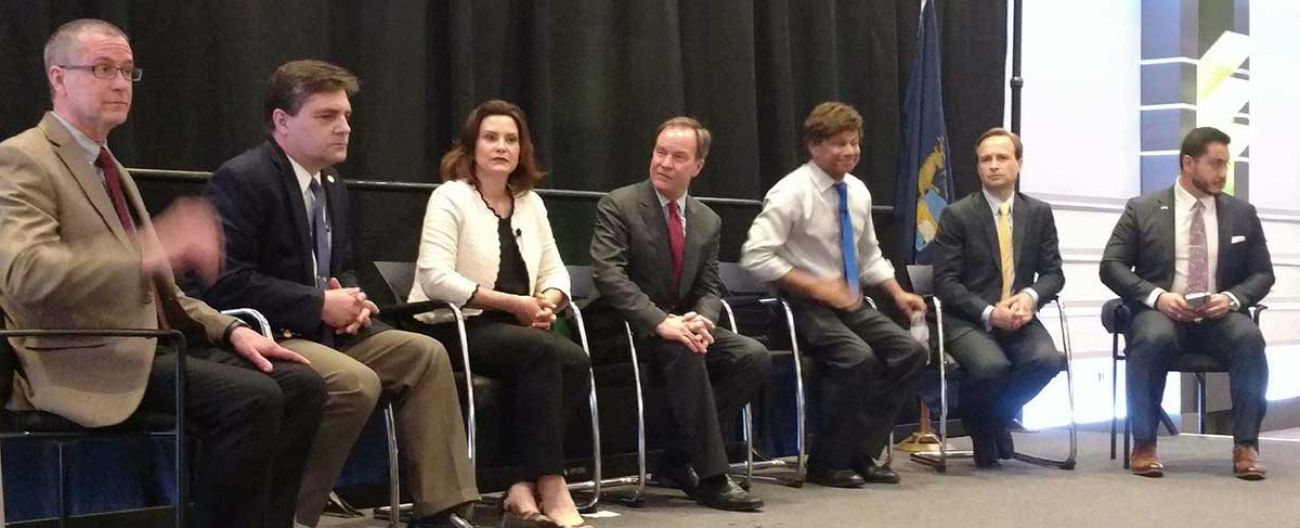Where do they stand? The governor candidates on their plans for Michigan

August 2018 update: Gretchen Whitmer wins Democratic primary for Michigan governor
August 2018 update: Bill Schuette wins Republican nod for Michigan governor
Repair the roads. Prepare students to succeed. Lower auto rates. Protect the Great Lakes. Grow Michigan’s jobs, economy and population.
Michigan’s gubernatorial candidates agree on a lot. They just disagree on how to get there.
In a series of hour-long interviews just a month before the Aug. 7 primary, six of the seven major-party candidates for governor shared their plans for Michigan’s future.
Related stories on Michigan governor candidate interviews:
- Is FOIA like the Russia probe? And other surprises from Michigan GOP candidates
- IDs for undocumented workers? And other surprises from Michigan Democrats
- Watch: In-depth interviews with Michigan candidates for governor
The full list of interview links are at the bottom of this story.
Bridge Magazine and its media partners in the Detroit Journalism Cooperative interviewed three Democrats (former Detroit Health Director Abdul El-Sayed, Ann Arbor businessman Shri Thanedar and former Sen. Minority Leader Gretchen Whitmer) and three of the four Republicans (Lt. Gov. Brian Calley, Sen. Patrick Colbeck and Saginaw obstetrician Jim Hines). Attorney General Bill Schuette did not attend, citing scheduling conflicts, but shared his vision with Bridge during a phone interview.
The three Republican candidates agreed on their commitment to keep taxes low, protect charter schools, save money and fix the roads without dramatically increasing funding.
However, there was a stark difference between Calley, who envisioned at least a small role for government support in almost every area, and his more conservative rivals.
For example, when asked what the state can do to mitigate the cost of child care and provide preschool options to young children, Calley outlined a system of combining a variety of social services to support children younger than age 5 and provide early childhood education akin to a program recently implemented in Flint. Hines said he’d consider ending state funding for child care programs, and Colbeck said the state should help “people that are going through transition phases” but indicated he did not support government aid as a long-term solution.
And as for whether the state should use tax incentives to attract businesses, Calley said he’d support them for “game-changer” deals, though they should not be the “go-to strategy.” Both Hines and Colbeck indicated that they wouldn’t.
Similarly, the Democrats agreed on broad strokes: Spending more on public schools, investing in infrastructure, and making at least a portion of higher education free.
But the three candidates often varied in the breadth of their proposed changes. Frontrunner Whitmer shied away from endorsing tax increases to pay for her programs, while El-Sayed and Thanedar were bullish about them.
All three said the cost of higher education is prohibitive. Whitmer said she’d create a scholarship for “a debt free two-year degree for every Michigander.” Thanedar said he’d make four-year college free for students coming from families making $120,000 or less. El-Sayed’s plan would do the same for those coming from families making less than $150,000.
A similar pattern played out with mass transit: El-Sayed supported funding public transportation systems not only in the Detroit area, but on the state’s western and northern coasts as well. Thanedar would fund expanded bus routes and a light rail in Detroit by asking the whole state to chip in. Whitmer said she supports a tax plan from the Regional Transit Authority in southeast Michigan but acknowledged that some local officials want the state to fix roads first.
Full text and video of Michigan governor candidate interviews:
- Brian Calley: What Michigan could learn from ‘Pissed Off Autism Moms’
- Patrick Colbeck: Eliminate income taxes to expand Michigan’s economy, population
- Jim Hines: Michigan school problems can’t be solved with money alone
- Bill Schuette: Michigan must fix education, lower taxes and car insurance
- Abdul El-Sayed: Expand health care, access to education in Michigan
- Shri Thanedar: Fix Michigan schools by taxing rich, reforming prisons
- Gretchen Whitmer: Grow Michigan by offering debt-free community college
See what new members are saying about why they donated to Bridge Michigan:
- “In order for this information to be accurate and unbiased it must be underwritten by its readers, not by special interests.” - Larry S.
- “Not many other media sources report on the topics Bridge does.” - Susan B.
- “Your journalism is outstanding and rare these days.” - Mark S.
If you want to ensure the future of nonpartisan, nonprofit Michigan journalism, please become a member today. You, too, will be asked why you donated and maybe we'll feature your quote next time!

